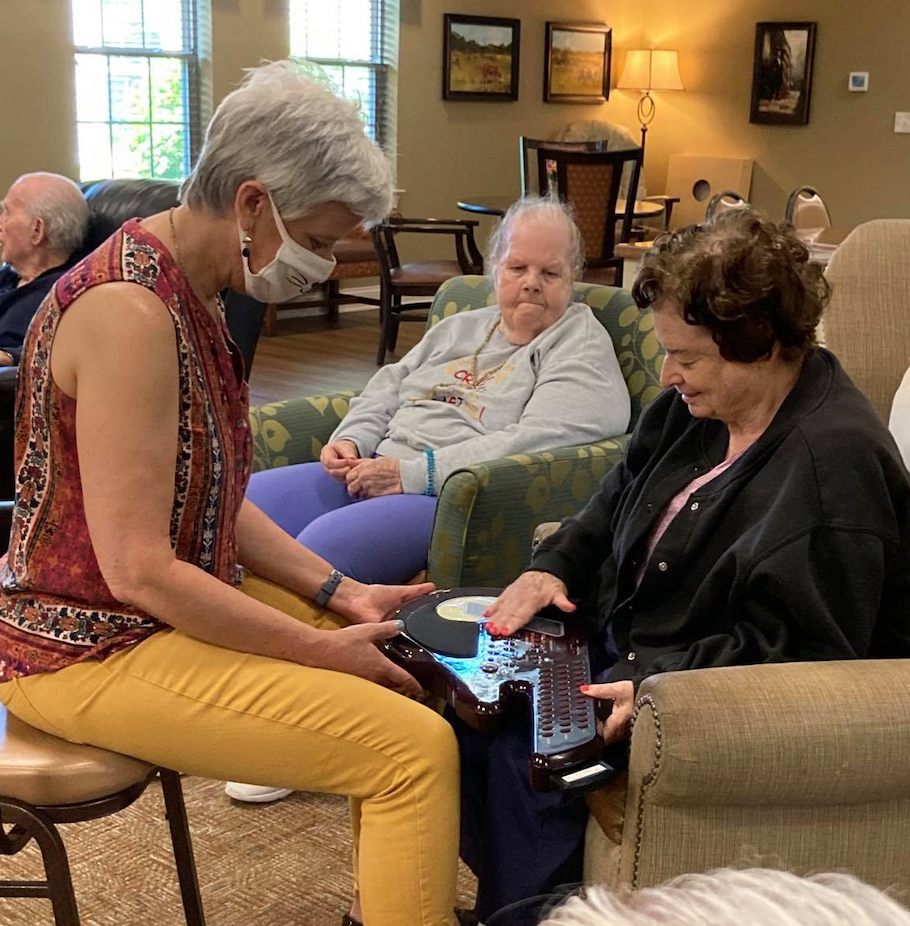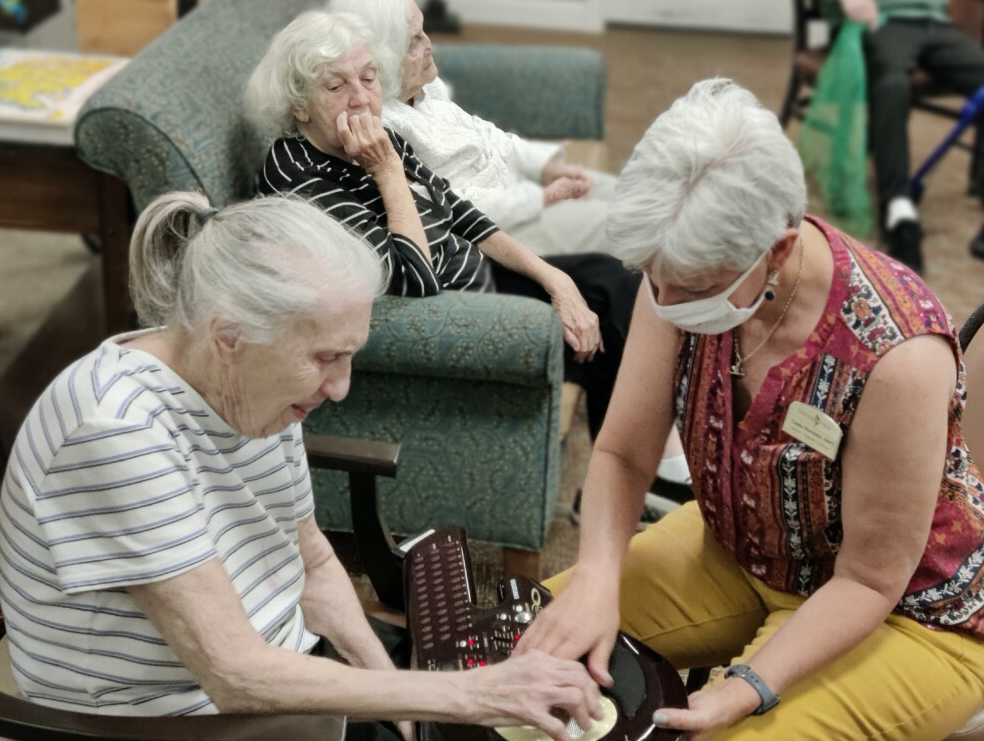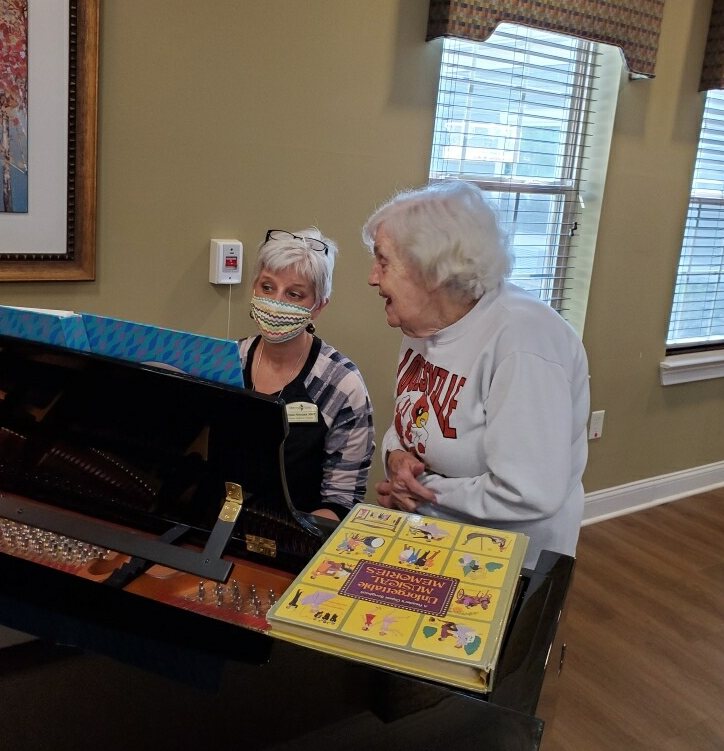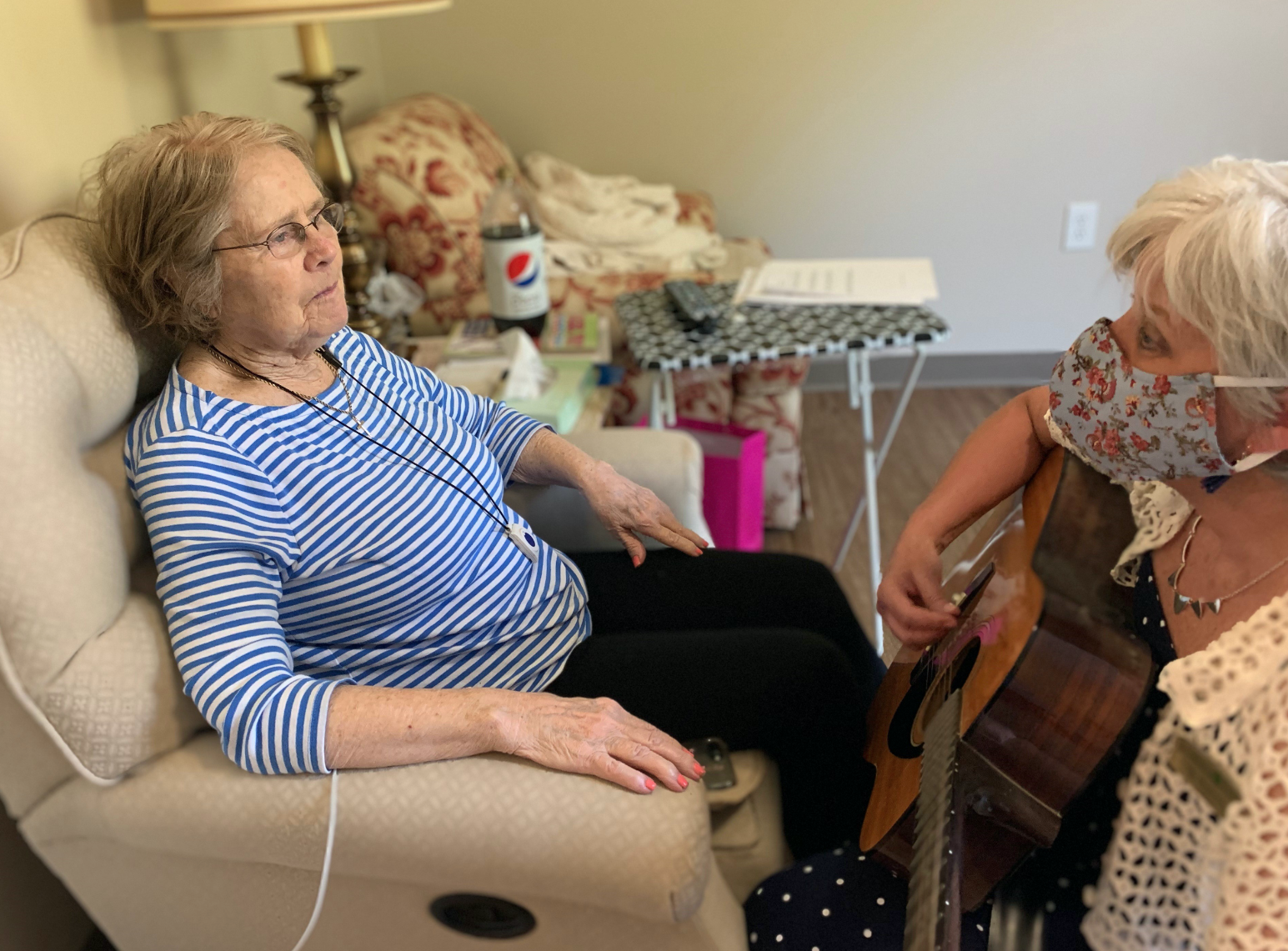Cindi Rhodes Exemplifies the Healing Power of Music
Writer / Annette Skaggs
Photography Provided
Music can be healing. When you have a rough day, or are celebrating a win or milestone, isn’t there some kind of music that you sometimes tie in with those events, and doesn’t it either alter or add to the feelings of the moment?
While lifting or elevating one’s mood with music can be helpful, being able to use that same tool to connect with another is too.
Cindi Rhodes serves as a music therapist for Morning Pointe of Louisville. Rhodes has been a musician for most of her life, having been raised with a mother who enjoyed performing in choral societies in her native South Carolina. With music imprinted on her, Rhodes attended Charleston Southern University with the intent to use music as a tool for healing. Right out of college, Rhodes received her certification as a registered music therapist.
What brought Rhodes to Louisville? Love, of course. With her high school sweetheart Patrick, Rhodes came to study at the Southern Seminary for a master’s degree in divinity in 1991, which then segued to attending the University of Louisville’s Kent School of Social Work.

Rhodes has an unusual distinction – she was the first music therapist in Kentucky. As one can imagine, it took her some time to find a clientele and organizations that were willing to take a chance on such a new and innovative way of therapy that is still being explored and expanded.
While settling in Louisville with her husband and two boys, Campbell and Andy, her career jumped around a little. She took a chance and served as a self-employed clinician for 15 years. While she was doing rather well for a time, making up to $30 an hour on some occasions, she found that she was losing clients due to their decisions to conduct therapy sessions in-house.
In 2000, the University of Louisville began to offer coursework in music therapy where Rhodes served as a clinical director. As part of the curriculum, the students would go out to preschools, nursing homes and Seven Counties to apply their learning and practicum.
“While the classes were rather small in the beginning, maybe four to five people, the interest grew as the practice became more widely learned and accepted as a viable career,” Rhodes says.
While she enjoyed her work at the university, Rhodes did some work with Signature HealthCARE for three years, where she was able to continue to hone her skills and talents while helping patients. She has been with Morning Pointe, an assisted-living retirement community (formally Lamplight), for the past year and a half, and she loves her patients and what she has accomplished.
“Music is so positive because we process music with almost every part of our brain,” Rhodes says. “We are able to be moved and feel the association. It is a remarkable feeling when you see a patient react, whether it be with a smile or a laugh when they’ve heard a familiar song, or have taken an instrument and made a delightful sound on their own. There is a strong connection between the brain’s auditory cortex and the limbic system. Sound is processed immediately by the area of the brain that is associated with long-term memory.”
What kinds of music do her patients react to?
“Believe it or not, our patients are influenced a lot by the kinds of music that our caregivers play around the area, especially the younger ones in our care,” Rhodes says. “At this time, I am using and playing quite a bit of big-band music, like Cab Calloway and Glenn Miller, and maybe some jazz. I get the most reaction from ’50’s rock and roll, and Elvis.”
Rhodes says there is often a connection to an individual’s favorite music.

“Familiar and likeable music can reduce depression, lessen agitation, and increase sociability, movement and cognitive abilities,” she says. “Through studies, it has been determined that familiar music can help to decrease problem behaviors. Part of the role of a music therapist is to activate a part of the brain that controls balance and movement, the cerebellum, in addition to the cognitive and limbic areas. We begin with passive listening, then move to active participation to involve the whole brain and body.”
This includes dancing and playing instruments.
“We use piano, rhythm instruments and vocal,” Rhodes says. “We sometimes have to coerce the patients into learning dance moves, but it is all for their benefit, to be sure. A typical day at Morning Pointe begins with a morning meeting, and then we move to exercise and music with cognitive activity. Lunch is then served, and recently we’ve been playing jazz with artists like Dave Brubeck in the background. After lunch is a quiet activity or game such as bowling or horseshoes, dinner, and then to cap off the evening, the residents and patients enjoy a sensory activity such as aromatherapy and soft music.”
One might imagine that there are rewards from the work that the therapists do.
“I’ve had stroke patients who have had successful vocal rehab because of music,” Rhodes says. “Because Alzheimer’s affects more than five million Americans, and this number doubles every five years, music has been a link to the past and a nourishing connection to the past. I see the happiness in our patients when they have that deep connection, and they are able to communicate it in some small but significant way. Aside from victories such as those, music brings physical and emotional closeness with friends and families.”

Rhodes says that while music therapy cannot change the course of a disease, it can provide opportunities such as engagement and socialization.
“In the earliest stages of therapy patients have been found to maintain memory, lower agitation, and maintain cognitive skills which add in sequencing tasks,” she says. “Conversely, in later stages the therapy has proven to reduce anxiety and stress, aid in the patient’s maintaining of motor skills, and increase attention, motivation and focus.”
In her spare time, Rhodes performs with a few different musical groups.
“I perform with the River City community band,” she says. “While we’ve not had a lot of opportunity to go out because of the pandemic, we’ve performed all over the area in the past. As a multi-instrumentalist I stay rather busy. I play clarinet, oboe, piano, organ and guitar. I also perform with the three-octave handbell chorus of First Baptist Church of Middletown.”
What is on the horizon for Rhodes?
“I look forward to when [Morning Pointe] can return to some normalcy, such as our monthly family nights, and being allowed to bring in outside entertainment, such as my handbell choir,” she says. “Personally, I see me spending time with my family and friends and practicing music therapy on the side, upon retirement.”






